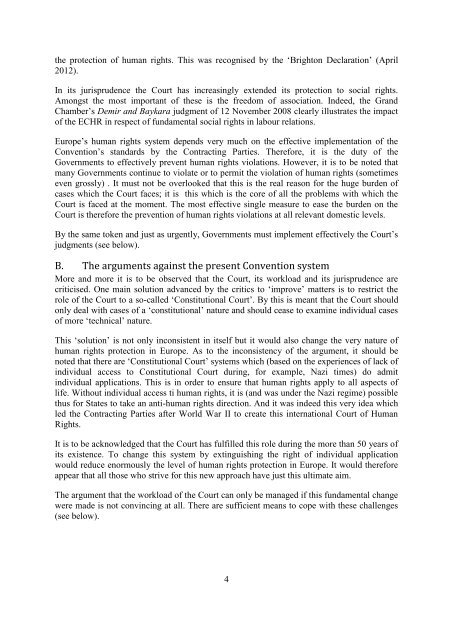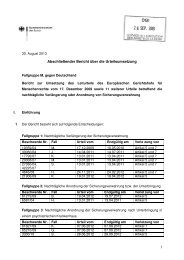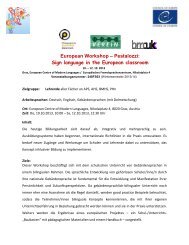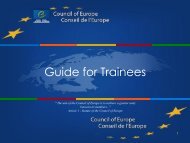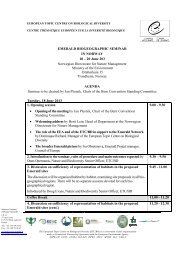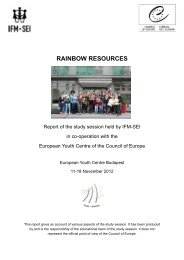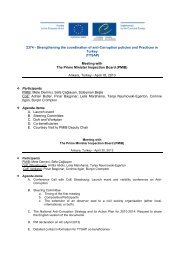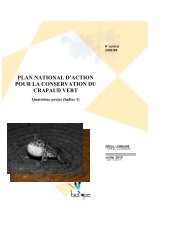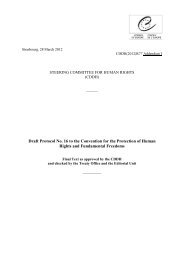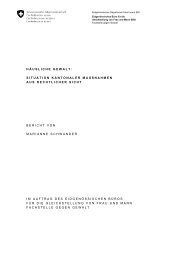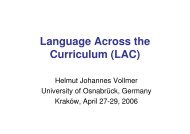Walter, Torsten - Council of Europe
Walter, Torsten - Council of Europe
Walter, Torsten - Council of Europe
Create successful ePaper yourself
Turn your PDF publications into a flip-book with our unique Google optimized e-Paper software.
the protection <strong>of</strong> human rights. This was recognised by the ‘Brighton Declaration’ (April<br />
2012).<br />
In its jurisprudence the Court has increasingly extended its protection to social rights.<br />
Amongst the most important <strong>of</strong> these is the freedom <strong>of</strong> association. Indeed, the Grand<br />
Chamber’s Demir and Baykara judgment <strong>of</strong> 12 November 2008 clearly illustrates the impact<br />
<strong>of</strong> the ECHR in respect <strong>of</strong> fundamental social rights in labour relations.<br />
<strong>Europe</strong>’s human rights system depends very much on the effective implementation <strong>of</strong> the<br />
Convention’s standards by the Contracting Parties. Therefore, it is the duty <strong>of</strong> the<br />
Governments to effectively prevent human rights violations. However, it is to be noted that<br />
many Governments continue to violate or to permit the violation <strong>of</strong> human rights (sometimes<br />
even grossly) . It must not be overlooked that this is the real reason for the huge burden <strong>of</strong><br />
cases which the Court faces; it is this which is the core <strong>of</strong> all the problems with which the<br />
Court is faced at the moment. The most effective single measure to ease the burden on the<br />
Court is therefore the prevention <strong>of</strong> human rights violations at all relevant domestic levels.<br />
By the same token and just as urgently, Governments must implement effectively the Court’s<br />
judgments (see below).<br />
B. The arguments against the present Convention system<br />
More and more it is to be observed that the Court, its workload and its jurisprudence are<br />
criticised. One main solution advanced by the critics to ‘improve’ matters is to restrict the<br />
role <strong>of</strong> the Court to a so-called ‘Constitutional Court’. By this is meant that the Court should<br />
only deal with cases <strong>of</strong> a ‘constitutional’ nature and should cease to examine individual cases<br />
<strong>of</strong> more ‘technical’ nature.<br />
This ‘solution’ is not only inconsistent in itself but it would also change the very nature <strong>of</strong><br />
human rights protection in <strong>Europe</strong>. As to the inconsistency <strong>of</strong> the argument, it should be<br />
noted that there are ‘Constitutional Court’ systems which (based on the experiences <strong>of</strong> lack <strong>of</strong><br />
individual access to Constitutional Court during, for example, Nazi times) do admit<br />
individual applications. This is in order to ensure that human rights apply to all aspects <strong>of</strong><br />
life. Without individual access ti human rights, it is (and was under the Nazi regime) possible<br />
thus for States to take an anti-human rights direction. And it was indeed this very idea which<br />
led the Contracting Parties after World War II to create this international Court <strong>of</strong> Human<br />
Rights.<br />
It is to be acknowledged that the Court has fulfilled this role during the more than 50 years <strong>of</strong><br />
its existence. To change this system by extinguishing the right <strong>of</strong> individual application<br />
would reduce enormously the level <strong>of</strong> human rights protection in <strong>Europe</strong>. It would therefore<br />
appear that all those who strive for this new approach have just this ultimate aim.<br />
The argument that the workload <strong>of</strong> the Court can only be managed if this fundamental change<br />
were made is not convincing at all. There are sufficient means to cope with these challenges<br />
(see below).<br />
4


